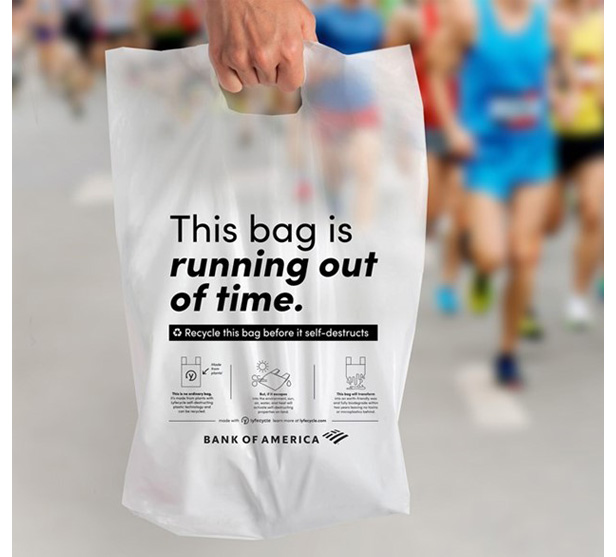October 12, 2022
Marathon Swag Bags Are Made to Self-Destruct
The 40,000 runners in this year’s Bank of America Chicago marathon received recovery bags made from plant-based, recyclable and biodegradable plastic.
Runners in the Bank of America Chicago Marathon this past weekend were greeted with a sustainability message at the finish line – in the form of plant-based, recyclable and biodegradable bags designed to tackle plastic pollution.

These recovery bags, handed out at the end of the Bank of America Chicago Marathon, are made from recyclable plastic designed to biodegrade in two years in natural conditions. (Courtesy of Polymateria)
The 40,000 recovery swag bags, stocked with post-race snacks and refreshments, are made of a so-called “self-destructing plastic technology” that’s designed to biodegrade quickly in open environments. Printing on the bags reinforces the idea, proclaiming, “this bag is running out of time,” and sharing instructions to “recycle this bag before it self-destructs.”
The Bank of America Chicago Marathon partnered with British company Polymateria to debut its Lyfecycle technology for the race. Lyfecycle products can be recycled, and recipients are encouraged to do so, but Polymateria says its product “offers a Plan B” for the plastic that escapes the circular economy and winds up in the natural environment. Thanks to “time-set biodegradation,” Lyfecycle’s plant-based plastic bags will break down within two years without leaving toxins or microplastics behind.
“Lyfecycle’s goal is to ignite action and cause a ripple effect that will solve ocean pollution and leave the planet in a better place for generations to come,” according to the company.
Carey Pinkowski, executive race director of the marathon, says the partnership with Lyfecycle is exciting. “Since 2010, our team has worked to incorporate environmentally and socially responsible practices into the production of our events, with the goal of limiting our impact on the communities we run through,” he said. “Lyfecycle is helping us advance this mission at this year’s race.”
Liepa Olsauskaite, head of activation for Lyfecycle, noted that the company is constantly pushing the limits of its technology. “Five years ago, it would have seemed impossible to product a self-destructing plastic bag,” she said. “And now, the bags that we are debuting at the marathon are not only recyclable and biodegradable, they are also made from renewable plant-derived materials, making it the most sustainable solution on the market.”
The recovery bags use renewable sugarcane, rather than fossil fuels, in the manufacturing process. Sugarcane captures carbon dioxide as it grows, reducing the impact the packaging industry has on climate change, according to Lyfecycle. Sugarcane plastic is also recyclable.
Lyfecycle uses a proprietary additive in the sugarcane plastic that lets it “self-destruct” after a set time period, transforming into an earth-friendly wax substance that breaks down in natural environments.
The Chicago marathon was the first running event in the U.S. to launch Lyfecycle’s technology, and Olsauskaite noted that it’s “part of a larger goal to showcase what this solution can do at scale.”
“With each event we participate in, we’re getting one step closer to stopping 450 million tons of plastic from reaching our oceans by 2040,” she said.

Promo for the Planet is your destination for the latest news, biggest trends and best ideas to help build a more sustainable and socially-responsible industry.
